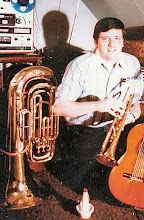Jazz Legend Pete Fountain Pleases Fans with the Standards
By Katie Van Syckle NOLA.com
Pete Fountain took the stage at New Orleans Jazz Fest on Sunday afternoon as any legend should - supported by a bevy of talented musicians, there to let the 81-year-old shine. Fountain, a.k.a "Mr. New Orleans," is considered by many to be the ambassador of Dixieland Jazz. Also a fixture during Carnival season, Fountain's "Half-Fast Walking Club" has been leading the downtown parade route on Mardi Gras since 1960.
Photo By Katie Van Syckle
Pete Fountain plays during New Orleans Jazz Fest accompanied
by his great-granddaughter Isabella singing, "What a Wonderful World."
Fans were pouring out the sides of the tent as the crowd chanted, "Let's go, Pete!" to greet the artist with a standing ovation. Smart phones lined the stage to snap his image.
"Mr. Music, Mr. Pete Fountain," his emcee said.
"Yeah Pete!" The crowd responded. In the middle of "Lazy River" the legend leaned on a stool to his right for support, but his smile did not fade. He enraptured the crowd during "Basin Street Blues." The air smelled like the recognizable Jazz Fest triumvirate of trampled grass, sweat and beer. A seated patron shushed chatter in the back row.
To the left of the stage, couples embraced in dance on a wooden surface reserved for the purpose. Fountain invited his great-granddaughter, Isabella, to the stage for an adorable rendition of "It's a Wonderful World." After a rousing response from fans, and a kiss for her great-grandfather, like any good diva, Isabella was wisked off stage and into the crowd.
The second line, led by three enthusiastic umbrella carriers, picked up steam. A man with a thick white beard, high socks and a tag that read "free hugs" did a robot dance across the tent. As Fountain served his trademark "A Walk with Thee," the second line still was in full swing, but the majority of the crowd sat calmly and respectfully.
For a moment, the reserved tent seemed like the polar opposite of any Springsteen-rock induced mayhem transpiring across the Fair Grounds at the Acura Stage. Then, a breeze of smoke blew by, and it was clear that although vibes may be diverse, some Fest fans are on the same party page.















